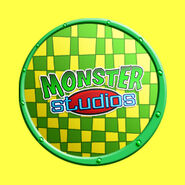
Monster Studios was an indie game developer founded in January 2000.[1] They worked alongside GarageGames in 2002 to develop Marble Blast. They also developed another puzzle game, Chain Reaction (also known as Gadgets), which was its flagship title. The company seemingly disbanded sometime before 2004.[2]
History[]
Monster Studios was founded in 1999 by Jeff Tunnell and Chris Cole. The company later hired Kevin Ryan, Brian Hahn, and Jay Moore.
Tunnell and Cole first began work on Chain Reaction in mid-1999. The game was the company's main focus throughout its existence, and development took three years. The Torque Game Engine did not debut until 2001 with the release of Tribes 2; as such, Chain Reaction did not employ it. Rather, a custom engine, the Reaction Engine, was created from scratch. It was described by creator Chris Cole as "a super light engine ... [built] in a way that it could be layered over the Torque (for porting purposes)".[3]
In the summer of 2002, Monster Studios and GarageGames jointly began work on Marble Blast. Some of the game's levels were created by them, as well as the game's art, music, and sound assets (many were even borrowed from Chain Reaction, such as the arrangement "Classic Vibe"). The art direction of Chain Reaction, and by extension, Marble Blast, was largely influenced by the cartoonish architectural style of Don Carson.[3]
On December 12th, 2002, the first Monster Studios game, Marble Blast, was released for digital purchase on the GarageGames store at a price of $14.95. This was followed by the release of Chain Reaction, the studio's second and final game, on December 20th, 2002, which was also available on the store for the same price. The price of Chain Reaction was later raised to $19.95, citing a lack of site traffic to justify the ultra-low price point.
Sometime during 2003, Monster Studios released the Reaction Engine and sold licenses for $59.95 each. Not long after the engine's release, a community project culminated in another game, titled Attack of the '80s Clones; it was described as a collection of ten "1980s styled arcade games".[4] However, the game was never released.
By late 2003, Monster Studios was no longer active. Both co-founders had left the company, and the website redirected to the GarageGames website.[2] The company's logo was not included in the 2005 XBOX port of Marble Blast, and none of its exclusive levels were created by Monster Studios.
While Marble Blast went on to become a relatively successful game franchise, Chain Reaction did not; this came despite the fact that at the time, Chain Reaction received more press attention than Marble Blast had. The studio later attributed this failure to releasing Chain Reaction's free demo over a month after the game had released; Marble Blast's demo, on the other hand, released about a week before the game went on sale. Chain Reaction's demo was later updated, featuring an improved interface and a timer feature, which unlocked the entire game for a short evaluation period.[4] In January 2003 interview, Chris Cole spoke the following of the matter:
|
A playable demo is crucial. Marble Blast's demo was released much closer to the games original ship date whereas Chain Reaction's demo was released over a month after the initial ship. We noticed a significantly different reception of both demos. Basically the CR demo was made available AFTER the reviews were posted while the MB demo was BEFORE the reviews were written. Who'd buy an indie game without first seeing it? Media on the Internet has a half-life of about twenty minutes. So when you release a product timing becomes critical. You need to have your infrastructure/support/testing in place BEFORE you release to the press. Chain Reaction, which did not use the TGE was released with the previously untested "Reaction Engine". We initially thought releasing the game before the demo would setup a sort of wide-beta and we could work some of the bugs out. This certainly happened, but at the expense of missing the media wave. You don't want to miss this media wave! When CR was much more stable and the demo was built the game had slipped from many peoples radar. Even though the CR demo is nearly a third the size of MB, it hasn't spread as fast. Spreading the demo is crucial to conversions into sales. |
Personnel[]
- Jeff Tunnell
- Chris Cole
- Kevin Ryan
- Brian Hahn
- Jay Moore
Contractors[]
- Paul Bowman
- Dave Scott
- Don Carson
- Tim Clarke
- Isaac Vanier
Notes[]
- The mascot seen in the Monster Studios logo is named "MC Monster". The character was used as the protagonist of Chain Reaction. The character was previously simply named "Monster"; the reason behind this change is unknown, but is likely to have been at eGames's request.


